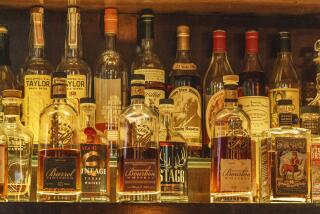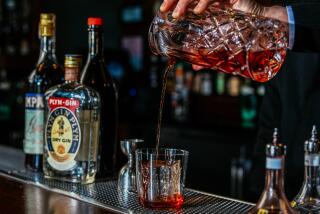A President’s 100-Proof Heritage Reborn
- Share via
WASHINGTON — George Washington: farmer, general, president . . . and whiskey maker?
Apparently, yes.
The Distilled Spirits Council is honoring the first president by joining forces with Mount Vernon to restore Washington’s distillery to full working order. The five-year, $1.2-million project will allow visitors to Washington’s plantation to see one of his most profitable business ventures in operation.
“People have really no concept of what a successful entrepreneur he was,” said James Rees, executive director of Historic Mount Vernon. “Demonstrating that he ran something on this scale . . . with cutting-edge technology really shows that . . . he wasn’t just the most powerful person in the 18th century; he was the most interesting.”
Washington came to whiskey making late in life, after being lobbied by his Scottish-born farm manager, James Anderson. As Washington was leaving the presidency in 1797, he agreed to Anderson’s plan to build a distillery on the grounds of the plantation’s gristmill. Grain from the mill was then used to brew corn and rye whiskey, and the leftover mash was fed to Washington’s (very fat) pigs.
By the time Washington died two years later, liquor was the plantation’s third-largest revenue source: 11,000 gallons of whiskey brought in $7,000 in 1799.
Mount Vernon officials have been working to restore the plantation’s moneymaking operations recently--the gristmill is to reopen as a working mill in 2002--and they recently turned their attention to the distillery. The plantation contacted Brown-Forman Corp., parent of the Jack Daniel’s distillery, and Brown-Forman brought in the Distilled Spirits Council, which agreed to pay for the restoration.
“This is a great way to show the American people that [whiskey making] is part of our country and our culture,” said Peter Cressy, president and chief executive of the Distilled Spirits Council.
The Smithsonian Institution has agreed to help the distillery project by lending to Mount Vernon a restored 18th century copper still that was seized in 1940 from a bootlegger in suburban Fairfax County, Va. Local legend suggests the bootlegger’s still, manufactured in 1787 in England, was one of the five originally at Mount Vernon.
It’s unclear whether the restored distillery will produce liquor. The Distilled Spirits Council has applied for a historic distillery permit from the state, but Rees said federal regulators told him it’s probably illegal to produce liquor for human consumption in an authentic 18th century manner.
More to Read
Sign up for Essential California
The most important California stories and recommendations in your inbox every morning.
You may occasionally receive promotional content from the Los Angeles Times.













